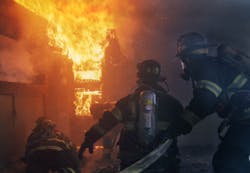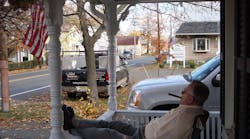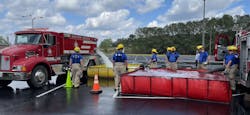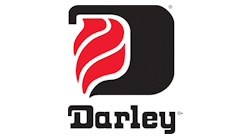Fornell: Passing on the Craft of Firefighting
A few weeks ago, I found myself with a relatively inexperienced crew advancing a line up a staircase to push back a fire that had pretty much involved the entire attic of a two story home. I didn't realize it at the time, but the person operating the nozzle was one of my newbies, having successfully passed his Firefighter 1 course, but never, until then, having to face a fire roaring out of the attic and involving the second floor.
It was hot and the thick swirling smoke hid flames overhead. It's been said that on the fireground, I may not be the most subtle speaker around, but inside a fire building, it's different. Quietly, I assured the nozzleman that yes, it is hot but until the heat starts to sting though his hood, it's manageable. While the lights blinking in his heads-up SCBA display showed he was marginal on air, I assured him that we would not back out until his Vibralert sounded, and we had an easy escape path down the stairs.
Simple things yes, but to someone who has never experienced fire combat on a face-to-face level, they can make all the difference between an inexperienced panic-induced rout or holding ground until the fire is stopped.
It wasn't until a few days later when the firefighter and I had a private conversation in the firehouse, that he reminded me that having someone there with the experience and knowledge enabled him to take charge of his apprehension and begin his long journey on the quest to being a better firefighter. I realize that his comments were not just about me but, about all of us senior firefighters and officers that can and should make a difference on how the fire service performs.
It also reminded me that every person that I have ever taught, has been told that when they commit to being a firefighter, they also commit from that day forward to pass on the craft.
Firefighting, unlike most other professions, is successful primarily because of the accumulated, intrinsic knowledge each member of this brotherhood gains throughout their career. And the code of the brotherhood compels all of us to pass on that knowledge to others.
A few years ago, Lt. Mike Nevin of the Detroit Fire Department and I sat down at lunch and discussed all those things common with two fire company officers getting together—fire tactics, the administration, new rules, techniques and personnel matters. He showed me a recent photo that he was rather proud of, a shot of him and a “new” person, waiting for water on the scene of a structure fire. I looked at the photo and immediately recognized a number of things that reminded me of why many of us are in the fire business, and the burdensome responsibilities of the company officer.
While the “new” guy in the photo, being assigned to a busy Detroit firehouse, has already had quite a bit of first-hand fire experience under his belt, he still is being “seasoned’, that is watched over by a more experienced member.
This made me think that one of the greatest responsibilities we have as senior members and company officers in the fire service is the sacred obligation to pass on our craft to newer members.
We share our experiences with each other because the profession is so diverse and we encounter so many situations that we may have never experienced before, and that we could never hope to see it all ourselves. Admittedly, even if assigned to a busy company, we all gain probably most of our operational knowledge from others who “have been there.”
This year, I will have almost 50 years in the fire service, yet almost every day, I find that I am still learning from others. The secret for success here is for all of us to open up our minds and let the knowledge flow in. We need to sort out some of the old habits and unsafe practices and get rid of them, making room for more practical and safer methods of operation and supervision.
The senior members and company officers especially bear the burden of responsibility to pass on the craft to new members, to instill a spirit that makes the firefighter proud to belong to a certain group and to make sure to lay a solid foundation so the new firefighter can continue to build on the experience and knowledge that almost every day, will be picked up from others.
When I was first promoted, I immediately noticed that all the tree branches were on my side of the cab, and I realized that if I was not on top of things at all times, I could loose my windshield. When you mount the officer’s front piece on your helmet, it signifies that immediately you become responsible for the well being of every one under your command. The thrill of handling the nozzle during attack operations now becomes one of handing it down, then making sure that the attack moves ahead swiftly and safely by teaching others what you learned since you started. An FDNY battalion chief once told me that the big officers’ handlight is probably the heaviest tool you will carry because it signifies that you no longer work primarily with tools, but with people.
I enjoy the role of a teacher and officer because it allows me to work directly with the “kids”, and enables me to pass along our craft. When holding a staff meeting before a live burn, I always make it a point to tell the gathered instructors that we will probably save a life that day, but it might happen years from now when one of the students, makes one of the right moves that we taught, and is able to safely sidestep a dangerous situation.
All the fire service practices manuals in the world can only show a newbie how to accomplish a basic task. What they can't show is when and how the task can to be safely and effectively accomplished on the fireground. That's why, I guess, they keep us older firefighters around.
I used to work for a chief who said that when I get information on the fireground, tell him and then everyone there will know. The fireground is no place for secrets, and neither is our noble profession.
The more we share the stronger we all will be. Make it so.







